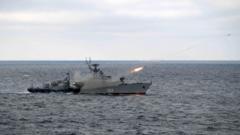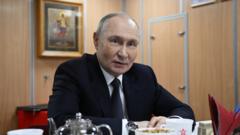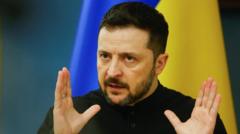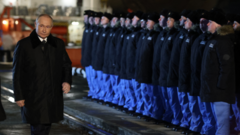Russia has declared it will only engage in a maritime ceasefire with Ukraine if certain Western sanctions on its banks are lifted. This announcement follows conflicting statements regarding a ceasefire that was tentatively agreed upon during U.S.-led peace talks. The implications of these sanctions and ongoing military actions are shaping the narrative of the ongoing conflict.
Russia Links Maritime Ceasefire to Lifting of Sanctions Against Its Banks

Russia Links Maritime Ceasefire to Lifting of Sanctions Against Its Banks
The Kremlin insists Western sanctions must be lifted before accepting a ceasefire deal with Ukraine, complicating the recent agreement brokered by the U.S.
Russia has stated that it requires the lifting of specific Western sanctions before it will commit to a maritime ceasefire with Ukraine, following announcements from the U.S. that both nations had tentatively agreed to halt hostilities in the Black Sea. The Kremlin emphasized that it would not proceed with a ceasefire until sanctions on key Russian banks, including the state agricultural bank Rosselkhozbank, are revoked, allowing them access to the Swift international payment system.
This request emerged shortly after a drone attack by Russia occurred on the Ukrainian port city of Mykolaiv, which President Volodymyr Zelensky condemned as an indication of Moscow's unwillingness to pursue peace. Western nations had previously cut off access to the Swift payment system for various Russian financial institutions after the full-scale invasion of Ukraine, aiming to disrupt Russia’s economic activities, particularly in energy and agriculture.
Reversing these sanctions would necessitate agreement from EU member states, which seems uncertain given the recent declarations of support for Ukraine. U.S. President Donald Trump remarked that Russia might be procrastinating on ending the conflict, underscoring the fragile situation.
The announced ceasefire resulted from three days of peace talks in Saudi Arabia but has since been marred by differing interpretations from both Kyiv and Moscow regarding its implementation, especially concerning sanction relief. Zelensky argued that the ceasefire agreement should take effect immediately without any conditions, describing the Kremlin’s insistence on sanctions lifting as manipulative.
Following the initial agreement, the U.S. affirmed its commitment to a "durable and lasting peace," alongside pledges from both countries to refrain from targeting energy infrastructures. The Black Sea, crucial for Ukrainian trade, has seen diminished grain exports since Russia withdrew from the Black Sea Grain Initiative in 2023, declaring any vessel heading for Ukraine a potential military objective. The geopolitical stakes in this naval theater continue to escalate, complicating efforts toward peace.




















